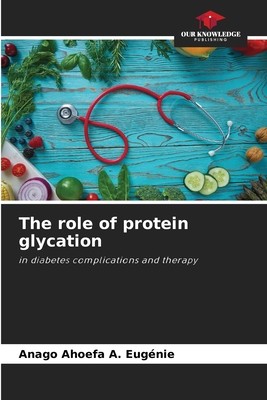
- We will send in 10–14 business days.
- Author: Anago Ahoefa A Eugénie
- Publisher: Our Knowledge Publishing
- ISBN-10: 6206109186
- ISBN-13: 9786206109181
- Format: 15.2 x 22.9 x 0.4 cm, softcover
- Language: English
- SAVE -10% with code: EXTRA
Reviews
Description
The binding of an ose, frequently glucose, to proteins is a common biochemical reaction leading to the formation of Advanced Glycation Endproducts (AGEs). The permanent hyperglycemia observed during diabetes leads to an increase in the glycation rate of proteins, with consequent impairment of their functions. Several authors have demonstrated the link between the accumulation of AGEs in various organs and the microvascular and macrovascular complications observed in diabetes. Other studies have shown that these diabetic complications and several other metabolic diseases result from a series of deleterious processes initiated by AGEs. These include receptor-mediated inflammation, conformational changes in macromolecules leading to aggregate accumulation, and an immune response mediated by the immunogenicity of AGEs.The main therapeutic approaches for the treatment of diabetes involve insulin administration, inhibition of polysaccharide-digesting enzymes (alpha-amylase and alpha-glucosidase) and glycation inhibitors.
EXTRA 10 % discount with code: EXTRA
The promotion ends in 16d.13:17:27
The discount code is valid when purchasing from 10 €. Discounts do not stack.
- Author: Anago Ahoefa A Eugénie
- Publisher: Our Knowledge Publishing
- ISBN-10: 6206109186
- ISBN-13: 9786206109181
- Format: 15.2 x 22.9 x 0.4 cm, softcover
- Language: English English
The binding of an ose, frequently glucose, to proteins is a common biochemical reaction leading to the formation of Advanced Glycation Endproducts (AGEs). The permanent hyperglycemia observed during diabetes leads to an increase in the glycation rate of proteins, with consequent impairment of their functions. Several authors have demonstrated the link between the accumulation of AGEs in various organs and the microvascular and macrovascular complications observed in diabetes. Other studies have shown that these diabetic complications and several other metabolic diseases result from a series of deleterious processes initiated by AGEs. These include receptor-mediated inflammation, conformational changes in macromolecules leading to aggregate accumulation, and an immune response mediated by the immunogenicity of AGEs.The main therapeutic approaches for the treatment of diabetes involve insulin administration, inhibition of polysaccharide-digesting enzymes (alpha-amylase and alpha-glucosidase) and glycation inhibitors.


Reviews